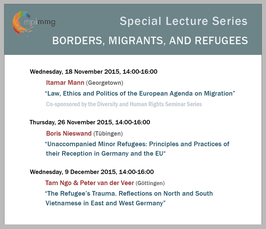"Unaccompanied Minor Refugees: Principles and Practices of their Reception in Germany and the EU"
Special Lecture Series "Borders, Migrants and Refugees"
- Date: Nov 26, 2015
- Time: 02:00 PM - 04:00 PM (Local Time Germany)
- Speaker: Boris Nieswand (Tübingen)
- Boris Nieswand is Junior Professor for Transnational Cultural Comparison and Migration at Tübingen University. He obtained a PhD in social anthropology from Martin Luther University Halle-Wittenberg in 2008 and a diploma in sociology from the University of Bielefeld in 2000. Boris Nieswand was a visiting professor at the European University Viadrina in Frankfurt/Oder, a research fellow at the Max Planck Institute for the Study of Religious and Ethnic Diversity in Göttingen and a PhD-candidate at the Max Planck Institute for Social Anthropology in Halle.
- Location: MPI-MMG, Hermann-Föge-Weg 11, Göttingen
- Room: Library Hall

For more details please contact esser(at)mmg.mpg.de.
Due to the current interest in diversity, scholarly attention to the interactions, overlaps and intersections between different person-related categories has been revived. “Age” is much less in the focus than “gender”, “race” or “class”. Nevertheless, due to the expansion and formalization of children’s rights, the legal status of “minors” has become more relevant on a global scale over the last decades. This especially applies to unaccompanied minor refugees. In Germany their legal pathway of inclusion is characterized by two major ambivalences:
- Ambivalences deriving from the characteristic modulation of the “right to have rights” (Arendt) implied in the status of being a minor. Minority provides access to some rights and resources that are not granted to adult refugees. At the same time, it takes some rights of personal self-determination and freedom away from individuals. Further, since refugees only in exceptional cases (can) present documents proving their identity, the category of being a minor becomes involved in larger considerations of identity management. Contested procedures of age estimation gained relevance for determining refugees’ pathways of institutional incorporation.
- There are ambivalences between humanitarianism, integrationism and a restrictive asylum regime as overlapping frames of reference that structure the pathways of inclusion of younger refugees. Since the 1990s, human rights organisations demanded that unaccompanied minors should be accommodated and treated according to regular youth welfare standards and not, as was the case for 16- and-17-year-olds, according to the standards of the asylum regime. Successively and backed by international legal developments the humanitarian position prevailed. One important factor that facilitated this shift in policy was an overlap between humanitarianism and integrationism.